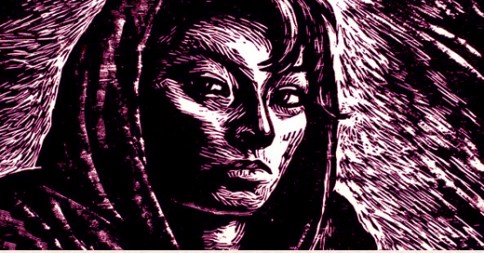The Zapatista’s struggle to reclaim dignity and autonomy is similar to the struggle of the Lakota
and other First Nation peoples.
AUSTIN — In mid-November, here in Austin, there was a meeting of two groups that reset the rhythm of my heart. Members of the Cooperativa El Rebozo of Oaxaca traveled to Austin and came to the Resistencia Bookstore in East Austin.
In spite of rain and cold, the room filled. Lilia Rosas’ welcoming hands revealed the small bookstore as sacred ground. The evening joined the continuum of culturally challenging events that the founder — the late poet and activist Raul Salinas — envisioned and nurtured.
As people gathered, Jaclyn Strong and I spoke, remembering that we had first met at the recent march in protest of the Keystone Pipeline. Posters for the teachings of Lakota elders, sponsored by the group Shield the People, who were coming in the next days, were displayed in the shop.
With her now were two Lakota elders, Russell Eagle Bear and Ben Rhodd.
I noticed that midway through the presentation Jaclyn slipped out, but she soon returned. With her now were two Lakota elders, Russell Eagle Bear and Ben Rhodd. Already sparkling from the messages that El Rebozo brought with them, the energy in the room intensified as they listened to the young people from the South.
It was time to pause — and there was unanimous agreement to move the chairs into a circle — to facilitate the dialogue that was to come. I crossed the circle and suggested to one of the members of the colectiva that we really should formally welcome the Lakota elders. He looked me in the eye and said something like, “Right. Please do.”
I tried to remember the meetings I had with Lakota people before, once at a harvest barter fair that I attended in Eastern Washington and once in Western Massachusetts, at a Sweat Lodge. I can’t really remember what I said this night, but I do remember that listening to Ben speak, I felt a relampago — an energy shift from the meeting of Lakota Elders, just in from South Dakota in the North, and Mexican youth who had just come from the South, carrying messages from the Zapatistas.
The struggle to reclaim dignity and autonomy that has been at the core of the Zapatista expression is not different from the struggle of the Lakota and other First Nation peoples in their fight against the various genocidal campaigns of the U.S. government. In Mexico, during la Conquista, the gold and silver was ripped from the land and transferred to the crown and church of Spain.
In modern Mexico, the plunder and control has a different face and method.
In modern Mexico, the plunder and control has a different face and method. It is worth noting that there are few banks left in Mexico that are owned by Mexicans; most are owned by Spanish, English, Scottish, and USian interests. Today resistance to the Keystone Pipeline, fracking, and extractions of one element after another has put native peoples at the forefront of the struggle to keep the mother earth alive.
El Rebozo brought the word from the South of the Zapatista’s invitation to The World Festival of Resistances and Rebellions Against Capitalism “Where those Above Destroy, We Below Rebuild” that is happening in various parts of Mexico, leading up to the 21st anniversary of the Zapatista’s arrival in San Cristobal de las Casas.
The Friends from Oaxaca are encouraging people from the Austin community to join them in Monterrey and travel together to Oaxaca and finally, to Chiapas. I have found this site from the EZLN to be helpful.
Simultaneously, our friends from the Lakota are in their winter camp, in protest of the Keystone Pipeline. Jaclyn Strong of Shield the People is their contact person here in Austin, if you are pulled North, rather than South, [shieldthepeople@gmail.com]. There is a possibility that some Lakota people may attend the Zapatista event.
While writing this, I listened to songs of the Lakota, Chucho Valdez, and Calle 13. In these first days of December, it is hard to know where I will be in the first days of the New Year. Can you imagine where you will find yourself? Which songs will reach your ears?
[Elaine Cohen moved to Austin in 1997 after she found Accion Zapatista’s website. Her involvement with immigrants began when she started work as a bilingual substitute for AISD. After another stay teaching in Mexico (2005-2010) she returned to Austin and discovered the Hutto Visitation Program. She has just completed her third year of visiting women in detention there.]



















really appreciate your article, Elaine,and the idea of the Americas joined together in this way